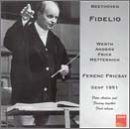| All Artists: Beethoven, Frcisay, Werth, Anders, Frick Title: Beethoven: Fidelio / Fricsay (1951) Members Wishing: 0 Total Copies: 0 Label: Gebhardt Records Release Date: 5/21/2002 Genre: Classical Style: Opera & Classical Vocal Number of Discs: 2 SwapaCD Credits: 2 UPCs: 675754509125, 4035122000450 |
Search - Beethoven, Frcisay, Werth :: Beethoven: Fidelio / Fricsay (1951)
CD Details |
CD ReviewsHigh spirits and powerful singing, but the orchestra is quit Santa Fe Listener | Santa Fe, NM USA | 08/23/2009 (3 out of 5 stars) "Fricsay has an enviable reputation as a Beethoven conductor, so this live fidelio from 1951 looks tempting as an alternative to his DG studio recording. there are some initial hurdles, however, the most important being the dreadful playing from the Suisse romande Orchestra. Never a vituoso ensemble, they fall apart in the overture to a shocking degree. Not only because the ensemble would disgrace a college rchestr, but intonation is non-existent. Where exactly was fricsay? It is the conductor's responsibility to oversee tehcnical aspects of a eprformance. But as soon as the singers enter, fricsay energizes the performance -- here given without dialogue -- and Lisa Otto's Marzellina is excellent; her argument with Jaquino actually sounds angry. The main attraction, however, are the two leads, Helen Werth as fidelio and Peter Anders as Florestan. The great first-act quartet is realy fine, with Weth and Otto blending well and Gottlob Frick adding his definitive Rocco, well known from the classic Klemperer set on EMI.
At this point one must asess the sound, which is clear mono that's reasonably free of distortion and surface distractions. Because of microphone placement, the singers move in and out of range but not drastically. On the whole this sounds like the sort of sonics we've gotten used to from Opera d'Oro and other semi-pirate labels. Also, compared to furtwangler's Salzburg recordings from this era, Fricsay is strinkingly modern in his quick tempos and tensile line. I found myself enjoying each section more than I expected to, even though Werth's intonation isn't perfect and the orchestra remains ragged. the secret is that everything feels energized from within -- this is nothing if not a fully committed Fidelio. And what of the big numbers? "Abscheulicher" is powerful and dramatic, but the sound grows echoey at this point since the singer is placed a bit far upstage. Needless to say, the horn ensemble is disgracefully messy, but Werth plows through with passion. the prisoners'chorus, 'O welche Lust,'begins with much stage shuffling, and it is sung in French! The orchestral prelude to florestan's aria is horribly played. Lucily, anders isn't placed too far back once he begins, and his phrasing is full of pathos a la Julius Patzak. But he's steadier than Patzak, who is vocally taxed in the furtwangler performances. Indeed, this is a wonderful rendition, save for the dreadful out-of-tune accompaniment. Fricsay whips up the dungeon melodrama in exciting, almost hectic fashion. 'O namenlose Freude' is too fast for the singers' comfort, but they do it justice vocally. In the finale the chorus sings in French, the soloists in German. So there you are. For sheer excitement, this is a riveting Fidelio, and the sound is more than adequate considering the source. But the French choruses are rather absurd, and then there's the dreadful orchestral playing. Worth a listen online, I'd say." |

